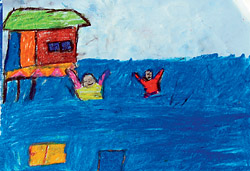Your Page
The 2004 tsunami washes away the notion that national tragedy is unique to America
Briefly gripped by “I-Am-Not-a-Tsunami-Victim” syndrome, I was haphazardly generous with my goodwill: virtuously patient with my sometimes-rambunctious children, rhapsodizing on the miracle of my husband’s existence while glossing over his imperfections, grateful for the merely inclement weather of Central Maine. Yet as I prepared to speak at an interfaith service in memory of those who died half a world away, I realized that we cannot live our lives in thankfulness for what is not; we must live it with hope for what can be.
I have a photograph of my parents silhouetted against the silver-touched southern sea of Sri Lanka. My father, never a swimmer, ever fearful of the surf, is leading my younger daughters away from the water. My mother, an athlete in her youth and still youthful, has hoisted her sari up to her knees and is holding my oldest daughter as she prances in the waves. How tightly my daughters grip my father’s hands. How competent he appears to them, though I know he is only mortal, hobbling a little after an operation on his foot.
When I think of the people tossed in the violent seas just two months later, that image haunts me. As parents we want to believe we can keep our children safe. We tell them so: “Don’t worry, I’m here,” we say, though we know there is a world of things from which we cannot protect them. We simply hope not to have to experience our fallibility first-hand. On Dec. 26, many did.In Sri Lanka, almost half the dead were children. I called my brother Malinda in despair and said, “Maybe I can take some of the children who have no parents?” And he, a father himself, reminded me, “It is not the children without parents — what can you do for parents who have no children left?”

When the tsunami struck, my other brother, Arjuna, was on a stretch of beach not far from the scene in my photograph. He carried his girlfriend’s daughter to a temple nearby and the three of them survived. They, four other Sri Lankans, and a British father traveling with his five children. Just before nightfall, that father waded through the destruction and returned to safety with food scraps he had found in the debris of adjacent hotels. Parents do what they can. Gratitude for survival soon gives way to what we need next.
Though a predominantly Buddhist nation, Sri Lankans celebrate all major religious observances: Vesak, Christmas, Ramazan, and Deevali. Arjuna was in that hotel celebrating Christmas. The first time I heard his voice after the tsunami was on public radio: “The night before I had been dancing…we all bonded…there were people from Finland, Dutchmen and Dutchwomen, British, Japanese…the next morning we were a big family of 150 people.”
A big family. Every one of us somebody’s child. Suddenly perspectives changed. Two doctors Arjuna had helped when he was in America caught a plane to find him and deliver water purification tablets and themselves. Sri Lanka, which has no diplomatic ties with Israel, was offered assistance of Israeli military doctors and accepted it. Tamil refugees and the Sinhalese army wept over each other’s children.
At the end of his radio interview, Arjuna said: “I was on top of the Rocky Mountains on 9/11…what I saw was what I heard — silence…there is a drone nobody notices until it stops. My nation is silent now.”
That September, America awoke to a new personal story of before and after. We became a people preoccupied with our own suffering, obsessed with securing our borders. In the post-tsunami narrative that enfolds us, we realize there are no impermeable boundaries. Our notions of nationality, race, religion, and cultural practices are subsumed by the fact that we are, first and foremost, citizens of the world.
My own history unfolds with a sense of reaching beyond the borders of the countries I call home. A visit to Thailand. Research on Saudi Arabia. A love for friends from both Palestine and Israel. Gold earrings from Medan, in Northern Sumatra, given to me by my father when I was 3, reminding me now of a place that used to be, where people walked and chose gifts for beloved children waiting back home.
I was revived by the following words, written in 1934 by Lloyd Stone and set to music by Jean Sibelius:
This is my home, the country where
my heart is;
here are my hopes, my dreams, my
sacred shrine.
But other hearts in other lands are
beating,
with hopes and dreams as true and
high as mine.
A silence fell over the world on Dec. 26, 2004. I will not forget its message in the bustling conduct of my newly grateful life.
Ru Freeman ’93, who lives in Waterville, has established the Sahana Project, which aims to link U.S. communities with those affected by the tsunami in Sri Lanka through direct assistance to the reconstruction of Kalametiya village on the southeastern coast of Sri Lanka.